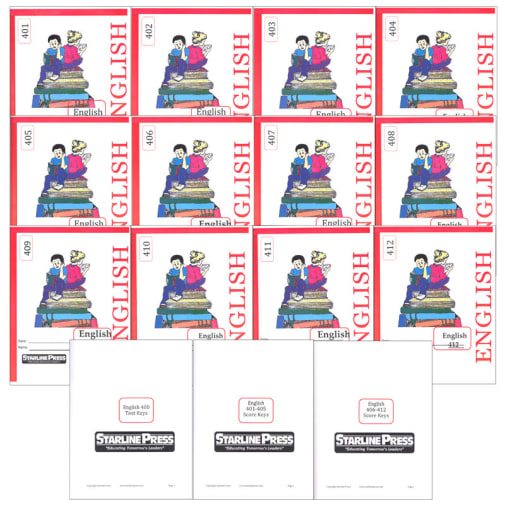Fourth grade units for English begin with alphabetizing and dictionary skills, word meaning and origins, and recognizing root words. Fourth graders identify antonyms, synonyms, idioms, and heteronyms as well as learn prefixes and suffixes. Please note that students will need a Webster's Collegiate Dictionary or The New Lexicon Webster's Dictionary for Unit 401. They will also begin to use a thesaurus in Unit 403. Students analyze literature, its themes, plots, and characters. They also learn to distinguish between different literature forms: fables, fantasy, legends and myths. Response to literature is introduced in Unit 406. Grammar skills such as organization of simple and compound sentences, applying regular and irregular verbs, subject-verb agreement, appositives and participial phrases are practiced. Students will also study writing skills by writing paragraphs, writing a dialogue, taking notes, doing research, and giving a speech. Cursive handwriting is also practiced (but not taught) along with phonics reinforcement.
Starline Press English 4th Grade Set
Description
Fourth Grade Language Arts students learn to alphabetize, use the dictionary, understand word meaning and origins, and how to find root words. Students analyze literature, its themes, plots and characters. Fourth graders demonstrate the use of the thesaurus. They identify Antonyms, Synonyms, Idioms and Heteronyms. Fourth grade students organize simple and compound sentences, applying regular and irregular verbs, appositives and participial phrases. They learn to distinguish between different forms of literature, such as fables, fantasy, legends and myths. Students demonstrate writing ability, making paragraphs, writing dialogue and giving a speech.
Designed as an independent learning curriculum, the Starline Press English programs cover a variety of language arts skills at grade appropriate levels. Aligned to California state standards (Please see publisher website for CA state standards correlation), each grade level provides self- directed instruction with minimal teacher supervision. Grades 3-8 complete twelve units (booklets) per year, with units averaging 24-60 pgs. each with a suggested 3 week completion timeframe. Grades 9-12 complete 5 booklets per semester/10 per year. Consumable booklets are colorfully illustrated and soft cover. Each grade level includes vocabulary lists, fill in the blank questions, chapter reviews, and unit tests. Literature studies are included in the fifth grade, seventh grade and upper high school levels. You may wish to include additional, grade appropriate literature with the other levels. Available only in complete sets which include score and test keys. ~ Deanne
| Product Format: | Softcover Book Set |
|---|---|
| Grade: | 4 |
| Brand: | Starline Press |
| Length in Inches: | 11 |
| Width in Inches: | 8.5 |
| Height in Inches: | 3 |
| Weight in Pounds: | 4.1563 |

